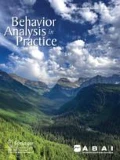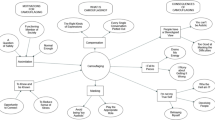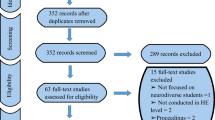Abstract
We taught three children with autism how to respond to abduction lures presented by strangers. We then tested undesirable generalization of the safety response to matched instructions to leave by a familiar adult. Following training, all three participants engaged in the safety response across both strangers and familiar adults. Thus, we evaluated a set of procedures for establishing discriminated responding. Appropriate responding to instructions to leave by strangers versus familiar adults was achieved only after discrimination training. Discriminated responding occurred across a novel setting and maintained across 3 months; however, performance during stimulus generalization probes within community settings was variable.



Similar content being viewed by others
Data Availability
Data are available from the corresponding author by request.
References
Axe, J. B., Phelan, S. H., & Irwin, C. L. (2019). Empirical evaluations of Skinner’s analysis of problem solving. The Analysis of Verbal Behavior, 35, 39–56. https://doi.org/10.1007/s40616-018-0103-4.
Beck, K. V., & Miltenberger, R. G. (2009). Evaluation of a commercially available program and in situ training by parents to teach abduction-prevention skills to children. Journal of Applied Behavior Analysis, 42, 761–772. https://doi.org/10.1901/jaba.2009.42-761.
Bergstrom, R., Najdowski, A. C., & Tarbox, J. (2014). A systematic replication of teaching children with autism to respond appropriately to lures from strangers. Journal of Applied Behavior Analysis, 47, 861–865. https://doi.org/10.1002/jaba.175.
Boudreaux, E. D., Ary, R. D., Mandry, C. V., & Mccabe, B. (2000). Determinants of patient satisfaction in a large, municipal ED: The role of demographic variables, visit characteristics, and patient perceptions. American Journal of Emergency Medicine, 18(4), 394–400. https://doi.org/10.1053/ajem.2000.7316.
Boudreaux, M. C., Lord, W. D., & Etter, S. E. (1999). Child abduction: An overview of current and historical perspectives. Child Maltreatment, 5(1), 63–71. https://doi.org/10.1177/1077559500005001008.
Carroll-Rowan, L., & Miltenberger, R. (1994). A comparison of procedures for teaching abduction prevention to preschoolers. Education and Treatment of Children, 17(2), 113–129.
Elliott, M., Browne, K., & Kilcoyne, J. (1995). Child sexual abuse prevention: What offenders tell us. Child Abuse & Neglect, 19(5), 579–594. https://doi.org/10.1016/0145-2134(95)00017-3.
Fisher, M. H., Burke, M. M., & Griffin, M. M. (2013). Teaching young adults with disabilities to respond appropriately to lures from strangers. Journal of Applied Behavior Analysis, 46, 528–533. https://doi.org/10.1002/jaba.32.
Gunby, K. V., Carr, J. E., & LeBlanc, L. A. (2010). Teaching abduction prevention skills to children with autism. Journal of Applied Behavior Analysis, 43, 107–112. https://doi.org/10.1901/jaba.2010.43-107.
Gunby, K. V., & Rapp, J. T. (2014). The use of behavioral skills training and in situ feedback to protect children with autism from abduction lures. Journal of Applied Behavior Analysis, 47, 856–860. https://doi.org/10.1002/jaba.173.
Hammer, H., Finkelhor, D., & Sedlak, A. J. (2002). Children abducted by family members: National estimates and characteristics (Juvenile Justice Bulletin No. NCJ196466). Washington, DC: Department of Justice, Office of Juvenile Justice and Delinquency Prevention.
Himle, M. B., Miltenberger, R. G., Flessner, C., & Gatheridge, B. (2004). Teaching safety skills to children to prevent gun play. Journal of Applied Behavior Analysis, 37, 1–9. https://doi.org/10.1901/jaba.2004.37-1.
Ingvarsson, E. T., & Hollobaugh, T. (2010). Acquisition of intraverbal behavior: Teaching children with autism to mand for answers to questions. Journal of Applied Behavior Analysis, 43, 1–17. https://doi.org/10.1901/jaba.2010.43-1.
Johnson, B. M., Miltenberger, R. G., Egemo-Helm, K., Jostad, C. M., Flessner, C., & Gatheridge, B. (2005). Evaluation of behavioral skills training for teaching abduction-prevention skills to young children. Journal of Applied Behavior Analysis, 38, 67–78. https://doi.org/10.1901/jaba.2005.26-04.
Ledbetter-Cho, K., Lang, R., Davenport, K., Moore, M., Lee, A., O’Reilly, M., & Falcomata, T. (2016). Behavioral skills training to improve the abduction-prevention skills of children with autism. Behavior Analysis in Practice, 9, 266–270. https://doi.org/10.1007/s40617-016-0128-x.
Ledbetter-Cho, K., Lang, R., Lee, A., Murphy, C., Davenport, K., Kirkpatrick, M., et al. (2019). Teaching children with autism abduction-prevention skills may result in overgeneralization of the target response. Behavior Modification. https://doi.org/10.1177/0145445519865165.
Lima, E. J., & Abreu-Rodrigues, J. (2010). Verbal mediating responses: Effects on generalization of say-do correspondence and noncorrespondence. Journal of Applied Behavior Analysis, 43, 411–424. https://doi.org/10.1901/jaba.2010.43-411.
Miltenberger, R., & Olsen, L. (1996). Abduction prevention training: A review of findings and issues for future research. Education and Treatment of Children, 19(1), 69–82.
National Center for Missing and Exploited Children. (2020). Nonfamily abductions and attempts. Retrieved October 20, 2020, from https://www.missingkids.org/theissues/nonfamily.
Peters, L. C., & Thompson, R. H. (2015). Teaching children with autism to respond to conversation partners’ interest. Journal of Applied Behavior Analysis, 48, 544–562. https://doi.org/10.1002/jaba.235.
Poche, C., Brouwer, R., & Swearingen, M. (1981). Teaching self-protection to young children. Journal of Applied Behavior Analysis, 14, 169–175. https://doi.org/10.1901/jaba.1981.14-169.
Rodriguez, N. M., Levesque, M. A., Cohrs, V. L., & Niemeier, J. J. (2017). Teaching children with autism to request help with difficult tasks. Journal of Applied Behavior Analysis, 50, 717–732. https://doi.org/10.1002/jaba.420.
Shillingsburg, M. A., Powell, N. M., & Bowen, C. N. (2013). Teaching children with autism spectrum disorders to mand for the removal of stimuli that prevent access to preferred items. The Analysis of Verbal Behavior, 29, 51–57. https://doi.org/10.1007/bf03393123.
Stokes, T. F., & Baer, D. M. (1977). An implicit technology of generalization. Journal of Applied Behavior Analysis, 10, 349–367. https://doi.org/10.1901/jaba.1977.10-349.
Sundberg, M. L. (2008). Verbal behavior milestones assessment and placement program. Concord, CA: AVB.
Wilson, C., & Brewer, N. (1992). The incidence of criminal victimisation of individuals with an intellectual disability. Australian Psychologist, 27(2), 114–117. https://doi.org/10.1080/00050069208257591.
Author Note
All data for this study were collected by Megan Leveque-Wolfe and Jessica Niemeier-Beck, under the supervision and guidance of Nicole Rodriguez. We thank the wonderful staff in the Early Intervention, Virtual Care, Severe Behavior, and Pediatric Feeding Programs for volunteering their time to serve as confederates.
Code Availability
Not applicable.
Funding
Internal funding from the University of Nebraska Medical Center’s Chancellor’s Office provided partial support for this research.
Author information
Authors and Affiliations
Contributions
All data for this study were collected by Megan Leveque-Wolfe and Jessica Niemeier-Beck, under the supervision and guidance of Nicole Rodriguez .
Corresponding author
Ethics declarations
Conflicts of Interest
All authors declare they have no conflicts of interest.
Ethical Approval
All procedures performed in this study involving human participants were in accordance with the ethical standards of the institutional and/or national research committee and with the 1964 Helsinki declaration and its later amendments or comparable ethical standards.
Consent to Participate
University institutional review board approval was obtained, and informed consent was obtained from the parents of all individual participants included in the study.
Additional information
Publisher’s Note
Springer Nature remains neutral with regard to jurisdictional claims in published maps and institutional affiliations.
Rights and permissions
About this article
Cite this article
Levesque-Wolfe, M.A., Rodriguez, N.M. & Niemeier-Beck, J.J. Consideration of Both Discriminated and Generalized Responding When Teaching Children with Autism Abduction Prevention Skills. Behav Analysis Practice 14, 396–409 (2021). https://doi.org/10.1007/s40617-020-00541-9
Accepted:
Published:
Issue Date:
DOI: https://doi.org/10.1007/s40617-020-00541-9




